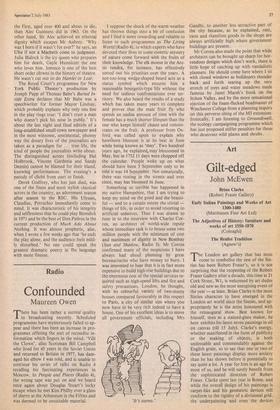Radio
Confounded
Maureen Owen
There has been rather a surreal quality to broadcasting recently. Scheduled programmes have mysteriously failed to ap- pear and there has been an increase in pro- grammes offering the sort of recondite in- formation which lingers in the mind. Willi the Clown', alias Scotsman Bill Campbell who lived for 45 years in the Soviet Union and returned to Britain in 1977, has dam- aged his elbow I was told, and is unable to continue his series of talks on Radio 4 recalling his fascinating experiences in Moscow. In People and Places (Radio 4), the wrong tape was put on and we heard once again about Douglas Stuart's lucky escape when he met Kim Philby over a glass of sherry at the Atheneum in the Fifties and was deemed to be unsuitable material. I suppose the shock of the warm weather has thrown things into a bit of confusion and I find it more rewarding and reliable to listen to such programmes as The Living World (Radio 4), in which experts who have devoted their lives to some esoteric mystery of nature come forward with the fruits of their knowledge. The elk moose in the Arc- tic tundra, for instance, has effectively sorted out his priorities over the years. A not-too-long wedge-shaped beard acts as a status symbol which ensures him a reasonable bourgeois-type life without the need for tedious confrontations over ter- ritory. We also heard the results of a study which has taken many years to complete and proves that the male fruit fly who ,spends an undue amount of time with the female has a much shorter lifespan than the one who keeps himself chaste and concen- trates on the fruit. A professor from Ox- ford was called upon to explain why hawthorn blossom is at its best in June while being known as 'may'. Two hundred years ago, he explained, may blossomed in May, but in 1752 I 1 days were chopped off the calendar. People woke up on what should have been 3 September only to be told it was 14 September. Not unnaturally, there was rioting in the streets and ever since, may has bloomed in June. Something so terrible has happened in my native Hampshire, that I am trying to keep my mind on the good and the beauti- ful — and to a certain extent the trivial things of life,• in order to avoid resorting to artificial sedatives, Thus I was drawn to tune in to the interview with Charles Cor- rea, an architect of world-wide repute whose immediate task is to house some two million people with the minimum of cost and maximum of dignity in New Bombay (Sun and Shadow, Radio 3); Mr Correa confirmed many of the suspicions I have always had about planning by great bureaucracies who have money to burn. I was interested to hear that it is in fact more expensive to build high-rise buildings due to the enormous cost of the special services re- quired such as high-speed lifts and fire and safety precautions. London, he thought, with its colourful variety of two-storey houses compared favourably in this respect to Paris, a city of similar size where you now have to be very rich indeed to have a house. One of his excellent ideas is to move all government officials, including Mrs `It's stereo.' Gandhi, to another less attractive part of the city because, as he explained, rent, rates and therefore goods in the shops are always artificially high where government buildings are present. Mr Correa also made the point that while architects can be brought up sharp for hor- rendous designs which don't work, there is little hope of catching up with vandalistic planners. He should come here where I sit with closed windows as bulldozers thunder back and forth tearing up the very stretch of trees and water meadows made famous by Janet Marsh's book on the Itchen Valley, and by the more sensational ejection of the foam-flecked headmaster of Winchester College from a planning inquiry on this perverse siting of the M3 extension. Ironically, I am listening to Groundswell, the ecology campaigning programme which has just proposed stiffer penalties for those who desecrate wild plants and shrubs.






































 Previous page
Previous page